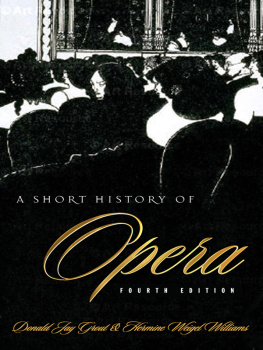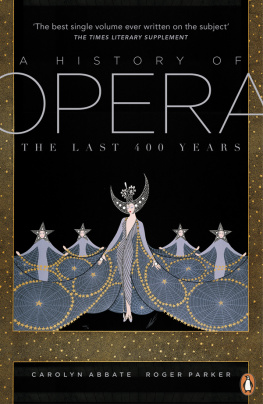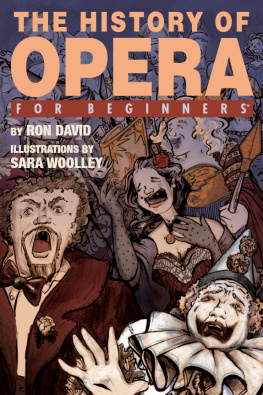A Short History of Opera
Donald Jay Grout & Hermine Weigel Williams

Columbia University Press
Publishers Since 1893
New York Chichester, West Sussex
cup.columbia.edu
2003 Columbia University Press
All rights reserved
E-ISBN 978-0-231-50772-1
Library of Congress Cataloging-in-Publication Data
Grout, Donald Jay.
A short history of opera / Donald Jay Grout and Hermine Weigel Williams.4th ed.
p. cm.
Includes bibliographical references (p. ) and index.
ISBN 0-231-11958-5 (alk. paper)
1. Opera. I. Williams, Hermine Weigel, II. Title.
ML1700.G83 2003
782.109dc21
2002041470
A Columbia University Press E-book.
CUP would be pleased to hear about your reading experience with this e-book at .
In memory of Donald Jay Grout and Margaret Dunn Grout

Contents
EARLY IN THE 1940s, Donald Grout recognized the need for a book that had for its purpose to offer a comprehensive report on the present state of our knowledge about the history of opera.
After retiring from Cornell University as Given Foundation Professor of Musicology Emeritus, Grout prepared several more editions of his History of Western Music and edited for publication a representative sample of Alessandro Scarlattis operas. He also kept alive a deep desire to bring forth a third edition of his opera history. Unfortunately ill health prevented him from undertaking that project, and although his name appears along with mine as a signature to the preface of the third edition of the opera history, the responsibility for the writing of that 1988 edition was mine alone. Grout did not live to see the third edition in print; he died in March 1987.
The present volume has been greatly revised and expanded in light of scholarly research of the past fifteen years. is now in the appendix.
To preserve a degree of continuity between the third and fourth editions, musical examples of the former have, for the most part, been retained; several new examples have also been added. Dates of operas refer to first performances unless otherwise specified. Places of performances are indicated sparingly. With few exceptions, translations of French, Italian, and German opera titles have been omitted from the text; they now appear only in the index. Opera titles in other languages, however, are translated in the text and are included in the index as well.
The bibliography is limited to works mentioned in the footnotes. Books that cover more than one chronological period are listed in the general section of the bibliography and in the section where they are cited in the notes.
I am indebted to friends and colleagues for help at various stages in the preparation of this edition. Particular thanks are due to Dr. Wolf-Dieter Seiffert, president of G. Henle Verlag; Ilkka Kalliomaa and the Finnish Consulate in New York City for information about operas by Finnish composers; Mirja Kiiveri of the Savonlinna Opera Festival and Hanna Fontana of the Finnish National Opera for photographs; Michael Willis of Glimmerglass Opera for providing several photographs of twentieth-century opera productions; Wendy Hillhouse for a photograph of a 1982 production of Scarlattis The Trimph of Honor; Joan Wolek and the staff of the Hamilton College Library for securing interlibrary materials; Anne R. Gibbons for her careful editing of the manuscript; members of the editorial staff at Columbia University Press for their guidance and encouragement; and my husband, Jay, for his unfailing support of my musicological endeavors.
Permission to print music examples is acknowledged in the section Sources and Translations of Musical Examples. Special acknowledgment, however, is made here to the following publishers for permission to use copyrighted material for new examples in this edition: G. Henle Verlag, Munich (Ex. 16.1), Warner Bros. Publications (Ex. 20.2), and European American Music Distributors LLC (Ex. 26.8a). Grateful acknowledgment is also made to the following for permission to use copyrighted material for the illustrations: Ron Scherl; George Mott and Glimmerglass Opera; Mara Eggert and the John Cage Trust; Kari Hakli and the Finnish National Opera; and Kuvasuomi Ky Matti Kolho and the Savonlinna Opera Festival.
Hermine Weigel Williams
Clinton, New York
January 2002
That day the sky was cloudless; the wind blew softly where we sat. Above us stretched in its hugeness the vault and compass of the World; around us crowded in green newness the myriad tribes of Spring. Here chimed around us every music that can soothe the ear; was spread before us every color that can delight the eye. Yet we were sad. For it is so with all men: a little while (some by the fireside talking of homely matters with their friends, others by wild ecstasies of mystic thought swept far beyond the boundaries of carnal life) they may be easy and forget their doom. But soon their fancy strays; they grow dull and listless, for they are fallen to thinking that all these things which so mightily pleased them will in the space of a nod be old things of yesterday.
WANG XI-CHI (353 C.E.)
. Grout, Preface to the First Edition, reprinted in A Short History of Opera (1988 edition), xvii.
. The 1947 and 1965 editions were issued in both a two-volume format with illustrations and a one-volume format without illustrations. They also appeared in several foreign language editions.
. There are, however, a number of titles for which a suitable translation could not be provided, given the idiomatic nature of the original.
THE CUSTOM OF USING MUSIC in connection with dramatic presentations is universal. It is found throughout the history of all cultures. This is perhaps because the desire to add music to drama is really part of the dramatic instinct itself and may have as its end either edification or entertainment.
An opera, briefly defined, is a drama in music: a dramatic action, performed on a stage with scenery by actors in costume, the words conveyed entirely or for the most part by singing, and the whole sustained and amplified by orchestral music. It is conditioned poetically, musically, scenically, and to the last details by the ideas and desires of those upon whom it depends, and this to a degree and in a manner not true of any other musical form. The opera is the visible and audible projection of the power, wealth, and taste of the society that supports it. Thus, study of its history is of value for the light it sheds on the history of culture in general.
One of the earliest examples of the term opera used as a descriptive subtitle for a drama in music can be found in the first volume of Raccolta de drammi, a collection of Venetian librettos that includes Malatesta Leonettis La Deianira, subtitled Opera recitativa in musica (1635). From that time forward, the term came into general use in England, and in the next century was adopted by France and Germany. Its use in Italy, especially in the period prior to the nineteenth century, remained relatively infrequent because descriptive subtitles such as favola in musica, favola pastorale, dramma per musica, feste teatrale, tragedia, tragicommedia, and the like were preferred.
Even though the term opera was not readily adopted in seventeenth-century Italy as a subtitle for dramatic works with music, it nevertheless seems to have been used there in common parlance during that era. Evidence for this comes from two entries in a diary kept by John Evelyn during his travels in Italy. When he was in Siena, he wrote the following on October 13, 1644: There is in this Senate-house a very faire hall, where they sometimes recreate the People with publique Shews and Operas, as they call them.
Next page








